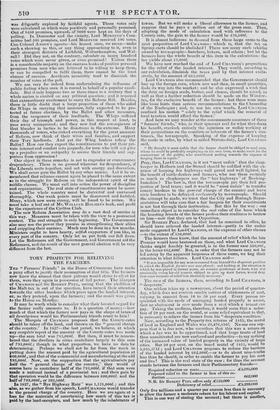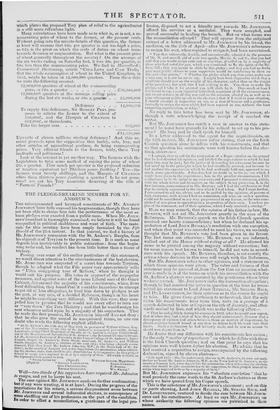TORY PROJECTS FOR RELIEVING THE FARMERS.
THE "Farmers' Friends" in the House of Commons have made a puny effort to justify their assumption of that title. The farmers now know the utmost that their patrons would strive to efli:et for them, were they again in possession of full power. The Marquis of CHANDOS and Sir ROBERT PEEL, seeing that the abolition of the Malt-tax is out of the question, have turned their attention towards the other burdens which press upon the landed interest, or, as they pretend, upon the farmers; and the result was given to the House on Monday.
It may be worth while to consider what their boasted regard for the farmer really amounts to. It is a question of money—how much of that which the farmer now pays in the shape of taxes of all descriptions would his Parliamentary friends remit to him?
The Marquis of CHANDOS proposes that the County-rates should be taken off the land, and thrown on the "general charge of the country." In I827—the last period, we believe, at which any complete report of the amount of the County-rates was made up—the sum total was 793,000/. But then, it must be rennin- bered that the dwellers in cities contribute largely to this sum of 793,000/.; though in what proportion, we have no data for determining. Perhaps we shall not be far from the mark in putting down the amount paid by the agricultural population at 600,0001., and that of the commercial and manufacturing at the odd 193,000/. Now, on the supposition that the agriculturists pay half the " general charge of the country," they would of course have to contribute half of the 793,0001. if that sum were made a national instead of a provincial tax; and their gain by that operation would be the difference between 600,000/. and the half of 793,0001., or 203,500/.
In 1827, the" Bye Highway Rate" was 1,121,0001.; and this -also, as we gather from his speech, Lord CHANDOS would transfer to the general charge of the country. Here we are again at a loss for the materials of ascertaining how much of this tax is paid by the land-occupiers, and how much by the inhabitants of
towns. But we will make a liberal allowance to the farmer, and suppose that he pays a million out of the gross sum. Then, adopting the mode of calculation used with reference to the County-rate, the gain to the farmer would be 439,500/.
It is almost ludicrous to descend from these large sums to the next proposition of Lord CHANDOS: which is, that the tax on Spring-carts should be abolished I There are many such vehicles owned by townspeople—butchers, bakers, and others; but let the farmers have the whole benefit of this item in the calculation: the tax yields about 19,000/.
We have now reached the end of Lord Crtaatnos's propositions for the relief of the landed interest. They would, according to our calculation, diminish the taxes paid by that interest exclu- sively-, by the amount of 662,000/.
Lord CHANDOS also recommended that the Government should buy up the foreign corn, which now and then, in small quantities, finds its way into the market; and he also expressed a wish that the duty on foreign seeds, butter, and cheese, should be raised, as well as that a further reduction should be made on the Window- tax, for the exclusive benefit of the farmer: but these were more like loose hints than serious recommendations to the Chancellor of the Exchequer ; and, to use his own words, Lord Crtaainos confined his motion " solely to the relief which the removal of local taxation would afford the farmer."
And here we may wonder at the consummate assurance of these "farmers' friends," who, in their ignorant zeal for what they deem his benefit, overlook entirely the injurious or unfair working of their propositions on the comforts or interests of the farmer's cus- tomers, the townspeople. Speaking of the expense of keeping the roads in order, by what is called Statute-duty, Lord CHANDOS said,
" Ile thought it most unfair that the farmer should be obliged to send men, whom he could be profitably employing on his own farm, to make roads for the convenience of the public, who contributed nothing towards the expense of keeping them in repair."
Pray, then, Lord Cum-mos, is it not "most unfair" that the shop- keeper in Holborn and the Strand should be saddled with the ex- pense of keeping his highways well paved and well lighted, for the benefit of cattle-dealers and farmers, who use them certainly as nmeli as shopkeepers use the " bye highways" of Bucking- hamshire ? The fact is, that the townspeople pay their full pro- portion of local taxes; and it would be "most unfair" to transfer county burdens to the general charge of the country and leave civic burdens to be defrayed exclusively by townspeople. Should the attempt be made, we trust that the City and Borough Repre- sentatives will take care that a fair bargain for their constituents is not lost through their inattention. But this by the way : our immediate object is to consider the real value of the boon which the boasting friends of the farmer profess their readiness to bestow on him—now that they are in Opposition.
Sir ROBERT PEEL declared, that had he remained in office, he should have relieved the landed interest—partly in the unfair mode suggested by Lord CHANDOS, at the expense of other classes —to the extent of 550,000/.
The farmers then know, that the amount of relief which the late Premier would have bestowed on them, and what Lord CHANDOS thinks might feasibly be granted, is in the former case 550,001., in the latter 662,000/. But, in order that the farmers may not be led astray by the apparent largeness of these sums, we beg their attention to what follows. Lord CHANDOS said— "It was impossible for any man to conceal from himself the desperate position in which the English farmer was now placed; and looking at the situation in which he was placed it, former years, no country gentleman at least, who was continually seeing his old tenants obliged to give up their farms, would deny that smile measure of relief was absolutely necessary."
The case of the farmers, then, according to Lord CHANDOS, is " desperate."
One seldom takes up a newspaper, about the period of quarter- day, which does not contain sundry notices of abatements of' rent, Varying in amount from 10 to 30 per cent. Every person ac- quainted with the mode of managing landed property is aware, that no abatement is ever made from a rent which a tenant can pay. Taking the medium, therefore, it would seem that a reduc- tion of 20 per cent. on the rental, or some relief equivalent to that, is necessary to relieve the farmer from his "desperate condition." Now, according to the Property-tax returns of 1815, the rental of land in England and Wales was 29,476,856/. No one can sup- pose that it is less now, who considers that this was a return on which a tax was to be apportioned, and that large tracts of land then uncultivated are now enclosed and productive—to say nothing of the increased value of landed property in the vicinity of large cities. But 20 per cent. on the taxed rental of 1815 would be 5,895,371/.; and Lord CHANDOS proposes to reduce tile burdens of the landed interest by 662,000/.—or to do about nine-tenths less than he should, in order to enable the farmer to pay his rent and live! This is the real state of the case ; for thus the account stands between the farmers and their Parliamentary friends—
Required reduction on rents Proposed relief to the farmer in lieu of this re- duction 662,000 N.B. Sir ROBERT PEEL offers only £550,000
Deficiency of relief £5,233,000 Only five millions and a quarter per annum less than is necessary to allow the farmer a moderate return for his labour and capital. This is one way of stating the account; but there is another,
',hien places the proposed Tory plan of relief to the agriculturist in a still more ridiculous light.
Many calculations have been made as to what is, or is not, a re- munerating price of wheat to the fernier, at the present rents. Without going into the minute details of this question, the farmer at least will assume that 60.s. per quarter is not too high a price, as 62s. is the pivot on which the scale of duties on wheat turns towards decrease or augmentation. But what is the present price of wheat generally throughout the country ? On the average of the six weeks ending on Saturday last, it was 40s. per quarter, or 20s. less than the remunerating price. We find in Macculloch's Commercial Dictionary, article "Corn-Laws and Corn Trade," that the whole consumption of wheat in the United Kingdom, in 1832, might be taken at 12,000,000 quarters. From these data we state the following account.
12,000,000 quarters of wheat at the remunerating price, or 608. a quarter £36 000,000 12,000,010 quarters at the average selling price
during the last six weeks, or 40s. a ,quarter . . 24,000,000 Deficiency . . . . 12,000,000
To supply this deficiency, Sir ROIIERT PEEL pro-
poses to relieve the farmer to the extent of
5.50,900/., and the Marquis of CHANDOS to
662,000/., or thereabouts.
Take the larger sum 662,000 1,3,000 Upwards of eleven millions sterling deficiency ! And this ac- count proceeds upon the supposition that barley, oats, hay, and other articles of agricultural produce, do bring remunerating prices. Very efficient friends to the farmer, truly, these Tory landlords and politicians!
Look at the account in yet another way. The farmers wish the Legislature to take some method of raising the price of wheat 20s. a quarter. How much per quarter is the proposed reduction of taxation equivalent to? Thirteen pence farthing ! Yes—the farmers want twenty shillings, and the Marquis of CH ANDOS offers them thirteen pence farthing a quarter ! Is he not gene- rous? are not his Tory associates deserving of the title of "Farmers' Friends?"



























 Previous page
Previous page